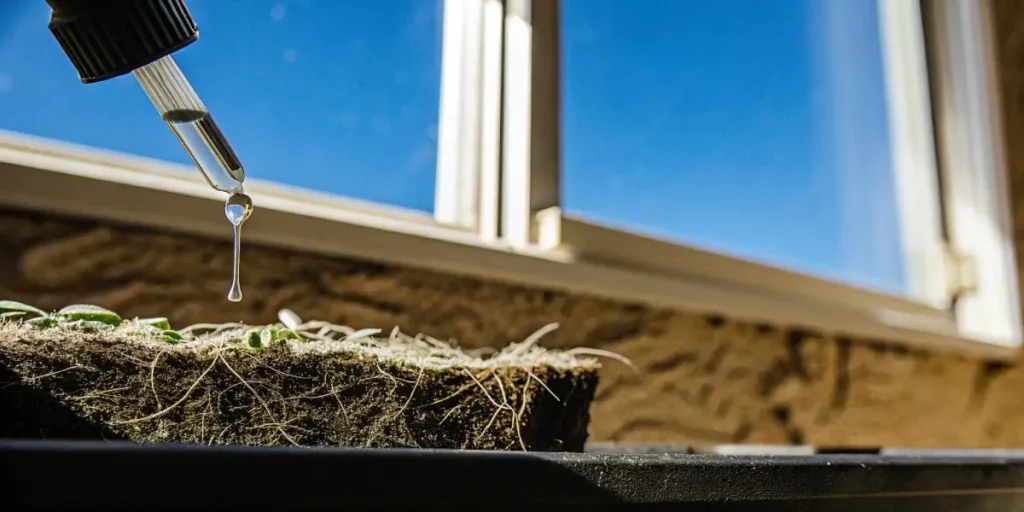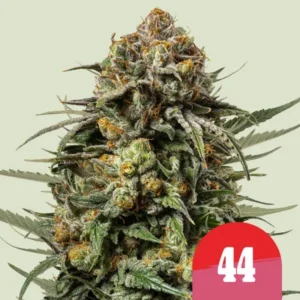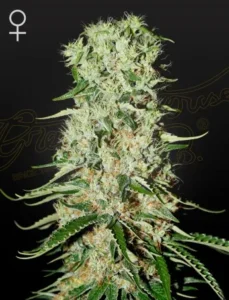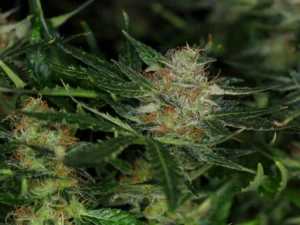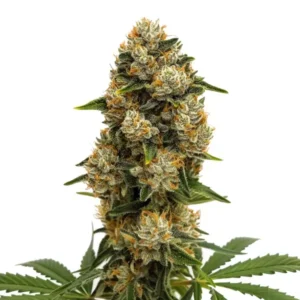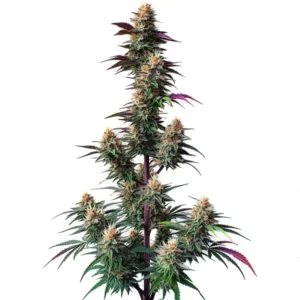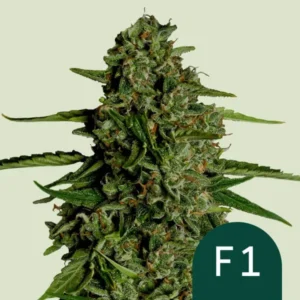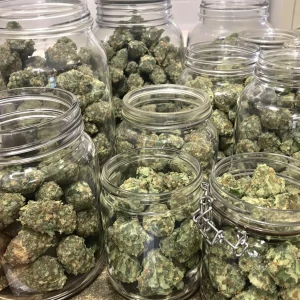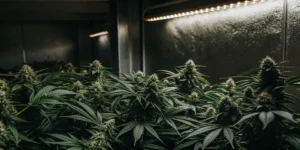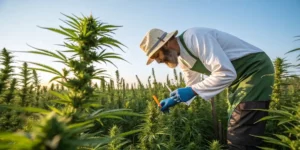Hydrogen peroxide for cannabis is a powerful yet often overlooked tool that can significantly improve plant health when used correctly. Thanks to its ability to release extra oxygen, hydrogen peroxide helps strengthen roots, prevent harmful pathogens, and improve overall growing conditions. Whether you’re dealing with root issues, pests, or poor soil aeration, understanding how hydrogen peroxide works allows growers to optimize cannabis plant care, boost resilience, and support healthier growth cycles from seedling to harvest.
Hydrogen peroxide is more than just a household disinfectant. It can be a game-changer for cannabis growers. This simple compound, composed of water with an extra oxygen molecule, offers multiple benefits for cannabis plants. Whether you’re a first-time grower or a seasoned expert, incorporating it into your routine can boost plant health and yield.
Recommended Strains
Gelato 44 - Tyson S
|
|
THC | 21% - 22% (Medium) |
|
|
Lineage | Sunset Sherbet X Thin Mint Girl Scout Cookies |
|
|
Type | Feminized |
|
|
Height | 4.92 ft | 1.5 m |
|
|
Yield | Medium |
|
|
Yield Indoor | 1.31 - 1.47 oz/ft² | 400 - 450 g/m² |
|
|
Yield Outdoor | 19.4 - 21.16 oz/plant | 550 - 600 g/plant |
|
|
Flowering Time | 8 - 9 weeks |
|
|
Phenotype | 75% Indica / 25% Sativa |
|
|
Effects | Creative, Euphoric |
|
|
Flavors | Citrus, Cookie, Earthy |
Damnesia
|
|
THC | 22% - 23% (Medium) |
|
|
Lineage | A.M.S. x Amnesia Haze |
|
|
Type | Feminized |
|
|
Height | 6.07 ft | 1.85 m |
|
|
Yield Outdoor | 35.27 oz/plant | 1000 g/plant |
|
|
Flowering Time | 9 - 10 weeks |
|
|
Phenotype | 40% Indica / 60% Sativa |
|
|
Effects | Focused, Creative, Talkative, Hungry |
|
|
Flavors | Woody, Fruity, Incense, Pepper |
Think of hydrogen peroxide as a versatile tool in your gardening toolkit. It’s not just about keeping things clean. It can enhance root oxygenation and combat pesky pests. When used correctly, it can make a significant difference in your cannabis cultivation journey.
Cannabis enthusiasts interested in varieties like Northern Lights, Blue Dream, and White Widow from Global Green Genetics can see improvements when they integrate hydrogen peroxide into their care routine. This compound can address common cultivation challenges effectively.
Benefits of Hydrogen Peroxide for Cannabis
Hydrogen peroxide benefits cannabis plants by providing extra oxygen. Roots love oxygen, and adding this compound can help them thrive. More oxygen means stronger roots, leading to healthier plants. Healthy plants are more resistant to diseases and produce better yields.
Another benefit is its ability to fight diseases. Fungal infections, like root rot, can devastate your crop. Hydrogen peroxide can prevent these issues. By cleaning the soil and discouraging harmful pathogens, it keeps your plants safe and sound.
Additionally, hydrogen peroxide for cannabis can aid in the breakdown of organic materials in the soil, making nutrients more readily available to the plant. This process supports vigorous growth and can lead to impressive flowering results. By enhancing nutrient accessibility, hydrogen peroxide ensures that your cannabis plants receive all the vital elements they need for development.
Furthermore, using hydrogen peroxide in cannabis soil can improve soil texture and drainage. This is particularly important for preventing waterlogging and ensuring that roots have constant access to the oxygen they need. With better soil conditions, your cannabis plants are set up for success from the ground up.
Enhancing Root Oxygenation
Roots are crucial for cannabis growth. They absorb water and nutrients, supporting the entire plant. By using hydrogen peroxide in cannabis soil, you increase oxygen availability. This extra oxygen helps roots grow stronger and more efficiently.
Consider mixing a small amount of hydrogen peroxide with water. This simple solution can be applied directly to the soil. It breaks down quickly, releasing oxygen and promoting root health. This method is easy and effective, especially for those growing strains like Blue Dream.
When learning how to use hydrogen peroxide for cannabis growth, it’s essential to understand the importance of root health. Strong roots mean a stable plant foundation, which is crucial for withstanding environmental stresses. By ensuring optimal oxygenation, you empower your plants to absorb nutrients more effectively.
Moreover, enhancing root oxygenation with hydrogen peroxide can also lead to faster growth rates. This can be especially beneficial during the vegetative stage when plants are building the structure needed to support heavy buds in the future. The result is a robust plant ready to produce an impressive harvest.
How to Use Hydrogen Peroxide for Cannabis Growth
Knowing how to use hydrogen peroxide correctly is key. Start by diluting it. A common mix is one part hydrogen peroxide to four parts water. This dilution is safe for plants and effective in delivering benefits.
Apply the solution during regular watering. Make sure to soak the soil thoroughly. For foliar sprays, use a more diluted mix to avoid leaf damage. This practice can help control pests and improve plant health.
Another important aspect of learning how to use hydrogen peroxide for cannabis growth is timing. Apply the solution during the morning or late afternoon to avoid the intense midday sun, which can cause rapid evaporation and diminish effectiveness. This timing ensures your plants have ample time to absorb the benefits.
Incorporating hydrogen peroxide into your regular care routine can also help achieve consistent results. By maintaining a schedule and observing your plants’ responses, you can fine-tune your approach to meet their specific needs, maximizing the benefits of hydrogen peroxide for cannabis.
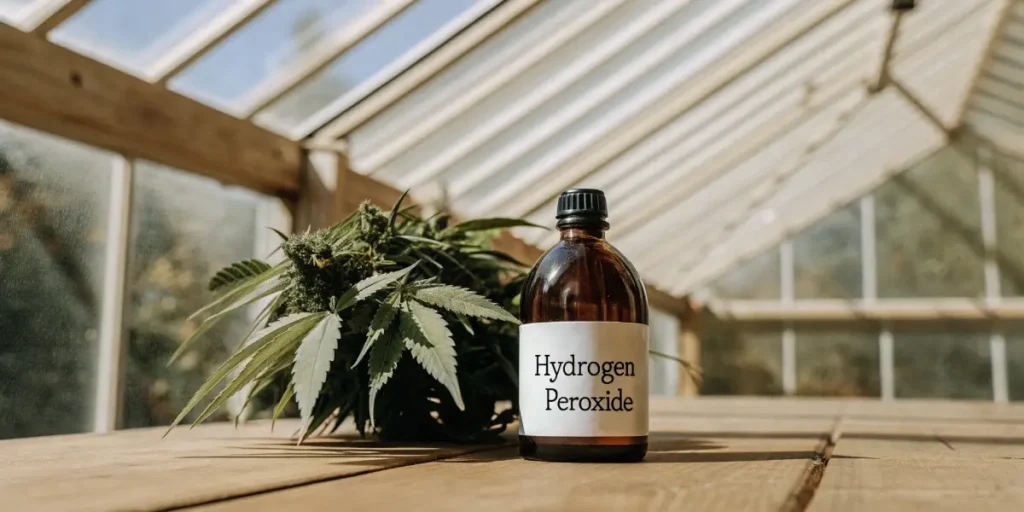
Hydrogen Peroxide Solution for Cannabis Pests
Pests can be a nightmare for cannabis growers. Fortunately, hydrogen peroxide can help. It acts as a natural pesticide, deterring unwanted insects without the need for harsh chemicals.
To tackle pests, create a foliar spray using a diluted hydrogen peroxide solution. Spray it on the leaves and stems, focusing on areas where pests are most active. This method is gentle on plants but tough on bugs.
Using hydrogen peroxide solution for cannabis pests is an effective strategy due to its ability to oxidize and break down the cellular structure of insects. This makes it a potent option for managing infestations without resorting to synthetic pesticides, which can leave harmful residues.
For best results, combine hydrogen peroxide treatments with other natural pest control methods, like introducing beneficial insects or companion planting. This integrated approach not only protects your cannabis plants but also fosters a balanced ecosystem within your growing environment.
Hydrogen Peroxide for Cannabis – Practical Usage Guide
| Use Case | Recommended Practice |
|---|---|
| Purpose | Oxygenation, disease prevention, pest control |
| Common concentration | 3% hydrogen peroxide (food-grade preferred) |
| Soil application mix | 1 part H₂O₂ : 4 parts water |
| Foliar spray mix | More diluted than soil solution |
| Best application time | Morning or late afternoon |
| Root benefits | Increased oxygen, stronger root development |
| Soil benefits | Breaks down organic matter, improves drainage |
| Disease control | Helps prevent root rot and fungal pathogens |
| Pest control | Effective against aphids, fungus gnats, mites |
| Application frequency (maintenance) | Every 2–3 weeks |
| Application frequency (pests/disease) | Weekly, short-term |
| Main risk | Overuse → root or leaf stress |
| Grower priority | Start diluted and observe plant response |
Using Hydrogen Peroxide in Cannabis Soil
Incorporating hydrogen peroxide into your soil routine can rejuvenate tired soil. It helps break down organic matter, making nutrients more accessible to your plants. This leads to better growth and increased yields.
When using hydrogen peroxide in cannabis soil, it’s important to monitor your plants. Adjust the concentration based on their response. Some plants may require a more diluted solution, especially young seedlings.
Another advantage of using hydrogen peroxide in cannabis soil is its ability to control harmful pathogens. By maintaining a clean and oxygen-rich environment, you reduce the risk of diseases that can hinder plant development and affect crop quality.
In addition to its pathogen-fighting properties, hydrogen peroxide also promotes beneficial microbial activity. This enhances soil fertility and supports sustainable plant growth, making it an invaluable addition to your cannabis cultivation practices.
Hydrogen Peroxide Cannabis Plant Care
Caring for cannabis plants with hydrogen peroxide involves regular observation. Check your plants regularly for signs of improvement or distress. This ensures you’re using the right concentration and method.
For strains like White Widow, maintaining optimal conditions is crucial. Hydrogen peroxide can help achieve this by enhancing soil aeration and preventing diseases. The result is robust growth and abundant harvests.
Effective hydrogen peroxide cannabis plant care also includes understanding the lifecycle of your plants. By tailoring your use of hydrogen peroxide to different growth stages, you can address specific needs such as root development, flowering, and pest resistance.
Moreover, maintaining a log of your hydrogen peroxide treatments can help identify patterns and optimize your approach over time. This proactive strategy ensures that you consistently provide the best care for your cannabis plants, leading to healthier and more productive growth cycles.
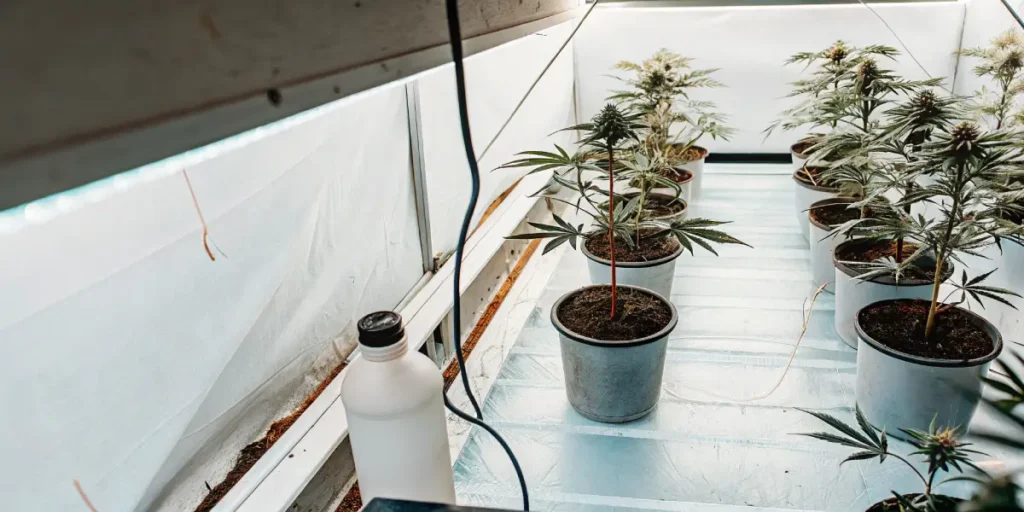
FAQs
Is hydrogen peroxide safe for all cannabis plants?
Yes, hydrogen peroxide is generally safe for all cannabis plants, provided you use the correct dilution. It’s important to start with a mild solution and observe how your plants react. Most plants, including popular strains like Northern Lights and Blue Dream, will benefit from its use.
However, young or particularly sensitive plants might need extra caution. If you notice any adverse reactions, reduce the concentration or frequency of use. Always prioritize the health and well-being of your cannabis plants.
Using hydrogen peroxide for cannabis as part of a balanced care regimen can enhance the overall resilience of your plants. By starting with a conservative approach and gradually increasing concentration, you minimize risks while still reaping the benefits.
It’s also beneficial to educate yourself on the specific requirements of the strains you are growing. Some may be more tolerant of hydrogen peroxide than others, and understanding these nuances can improve your cultivation success.
How often should I use hydrogen peroxide on my cannabis plants?
The frequency of application depends on the specific needs of your plants and any existing issues. For routine care, using hydrogen peroxide once every few weeks is sufficient. This helps maintain good root health and prevents disease.
If you’re dealing with a pest issue, more frequent applications might be necessary. In such cases, a weekly foliar spray can help control the problem effectively. Monitor your plants closely to determine the best schedule.
For preventive care, integrating hydrogen peroxide into your schedule every two to three weeks can help maintain plant vitality without overwhelming them. This balanced approach ensures you address potential issues before they escalate.
In periods of rapid growth or stress, adjusting the frequency of hydrogen peroxide application can provide the support your plants need. By staying attuned to your plants’ needs, you can optimize their health and productivity.
Can hydrogen peroxide improve my cannabis yield?
Yes, hydrogen peroxide can improve your cannabis yield by promoting healthier roots and preventing diseases. Strong roots support better nutrient uptake, leading to more vigorous growth and larger buds.
For growers cultivating strains like White Widow, a boost in yield can be particularly rewarding. By integrating hydrogen peroxide into your regimen, you create a more favorable growing environment, resulting in higher-quality harvests.
Additionally, hydrogen peroxide for cannabis encourages robust flowering by keeping pathogens at bay and ensuring optimal nutrient absorption. This is crucial for developing dense, resinous buds that are rich in cannabinoids and terpenes.
Regular use of hydrogen peroxide can also lead to improved plant resilience. This means your cannabis is better equipped to handle environmental fluctuations, further contributing to consistent and enhanced yields.
What should I do if my plants react negatively to hydrogen peroxide?
If you notice negative reactions after using hydrogen peroxide, such as wilting or leaf discoloration, stop its use immediately. Flush the soil with plenty of water to remove any excess peroxide.
Evaluate the concentration and ensure it was appropriate for your plants. Consider waiting a few weeks before reintroducing it, possibly in a more diluted form. Always prioritize plant health and adjust your practices as needed.
Careful monitoring and quick intervention are key when hydrogen peroxide cannabis plant care goes awry. By promptly addressing any adverse effects, you can minimize damage and aid recovery.
In some cases, adjusting the overall growing conditions, such as light levels or feeding schedules, may also help alleviate stress and support plant recovery. A holistic approach ensures your cannabis plants regain their health swiftly.
Is hydrogen peroxide effective against all cannabis pests?
Hydrogen peroxide can deter many common pests, but it might not be effective against all. It works well for surface pests like aphids and fungus gnats. However, systemic issues may require additional methods.
For comprehensive pest control, combine hydrogen peroxide with other natural remedies. This holistic approach can protect your cannabis plants and ensure a successful growing season. Always tailor your strategy to the specific pests you encounter.
Hydrogen peroxide solution for cannabis pests is most effective when used as part of an integrated pest management plan. By combining it with cultural practices, such as maintaining cleanliness and proper spacing, you enhance its efficacy.
For pests that penetrate deeper into plant tissues, additional measures like neem oil or beneficial nematodes may be necessary. Understanding the nature of the pest infestation allows for targeted and effective control strategies.

